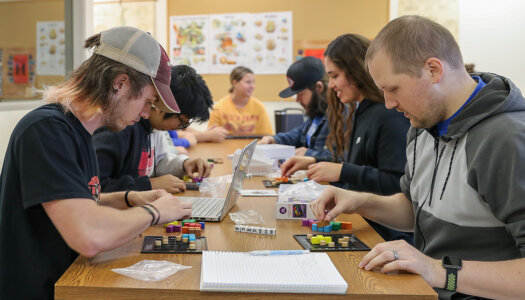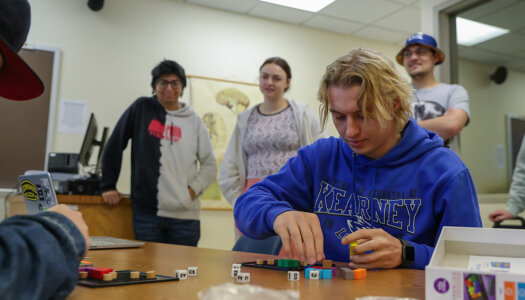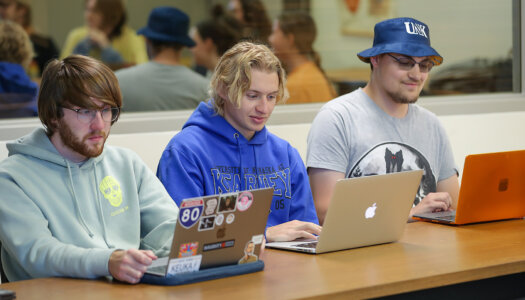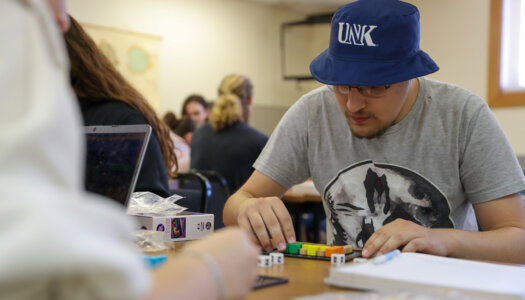
By TYLER ELLYSON
UNK Communications
KEARNEY – Like many other millennials, Katherine Moen grew up with video games.
As a young girl, she played Nintendo and Super Nintendo at friends’ houses, then returned home to beg her own parents to buy a console. She usually received the same response.
“I can’t count the number of times my parents told me that video games were going to rot my brain,” Moen said. “It was somehow worse than watching TV. Like, you should just go outside and play.”
Eventually, her parents gave in and purchased a PlayStation 2 for Moen and her four brothers. They received the system for Christmas 2001 and, more than 20 years later, Moen still considers herself to be a “gamer” – sort of.
“Let me put it this way, I thought I was a gamer before I met some of the students in my class and I realized we’re nowhere near in the same league,” she said with a laugh.
An assistant professor of psychology at the University of Nebraska at Kearney, Moen enjoys a variety of video and board games, which she often plays with her husband Corey and daughter Clara.
Those experiences inspired her newest class, The Psychology of Gaming.
“I first came up with the idea several years ago when I was playing Mario Kart with my family,” she explained. “As we were playing it, I realized I was paying attention to anything that was yellow, because I was so sick of hitting bananas and spinning out. In that moment, I thought, ‘This is a great example of having an attentional set for something.’”
Unlike her parents – and countless others – Moen saw the value in gaming.
“Over the last decade especially, there’s been so much research on the benefits of video games from a wide perspective,” she said, noting their impact on attention, creativity, critical thinking, memory, motivation, problem-solving, visual imagery and other cognitive skills.
The Psychology of Gaming, a special topics course she started teaching this semester, allows students to learn about these concepts through the lens of something they already love.
“I’m teaching them about psychology, but we’re doing it by talking about games.”

ENGAGING ENVIRONMENT
Moen’s course covers everything from backgammon, first played in 3000 B.C., to League of Legends, a popular online game with more than 150 million players worldwide.
Whether she’s talking about puzzle games, strategy games, role-playing games or simulations, the same concepts come up.
“Almost every element of a game is rooted in some psychological concept, in some way,” she said. “The way the game interface is set up has a lot to do with the different types of things people pay attention to. The things you encounter throughout the game are related to how easy it is for people to remember different things, so you can remember what you did three levels ago in order to make progress through the game.”
Moen connects those concepts to the real world by encouraging discussion – lots and lots of class discussion.
“Going into it, I was really worried that people weren’t going to talk and that it was going to be a whole lot of awkward silences, but this class has been so much fun,” she said. “I think I’ve only had one class all semester where we actually got through everything I had planned for that day because these students are so excited about the material and making those connections.”
In a room filled with students from all grade levels, each 75-minute class feels more like a club meeting.
“It’s a lot more engaging than a regular lecture class. There are a lot more discussions and we actually have to get up and do presentations,” said Alyssa Seim, a freshman from Grand Island. “It’s very interactive and that makes learning those really hard psychological concepts so much easier because you can connect it to something that you do on an almost daily basis.”
The 16 students who signed up for the course – most of them psychology majors – feel comfortable sharing their opinions, stories and personal experiences, which adds to the learning environment.
“We have a bunch of different people who have either never played games before or are very, very avid gamers. I love that range. It’s a lot of fun and it makes discussions really interesting,” said Seim, who’s studying psychology with a behavioral and mental health minor.
“It actually makes me want to come to class because I really enjoy it,” she added.

Peer-reviewed research is another emphasis area, giving students an opportunity to analyze, interpret and present findings related to video games. For instance, studies have shown that playing strategy games can help slow cognitive decline in older adults and pairing Tetris with therapy can improve outcomes for people suffering from post-traumatic stress disorder.
At the end of the semester, each student will create a poster highlighting a positive aspect of gaming.
“I want them to take something from this class and share that information with their classmates and the UNK community so more people understand that video games aren’t just something that’s slowly rotting your brain and that they can be this really beneficial tool in many different situations,” Moen said.
Joey Auch Moedy, a junior from Omaha, is already spreading the word.
“I’ve given like seven elevator pitches about this class,” he said. “I’ve gone to a lot of other psych majors and I’ve been like, ‘Hey, this is a really cool thing.’ And they’re like, ‘But I don’t play video games.’ You don’t have to. You can play a board game and learn these psychology concepts along with all these other people.”
The Psychology of Gaming is a special topics course offered as an elective right now, but Moen plans to submit a proposal to the College of Arts and Sciences Educational Policy Committee with hopes of having it added to the regular curriculum.
Even her father, now 61, supports the idea of combining video games and higher education.
“My dad thinks it’s great,” Moen said with a smile. “He thinks it’s super cool.”





